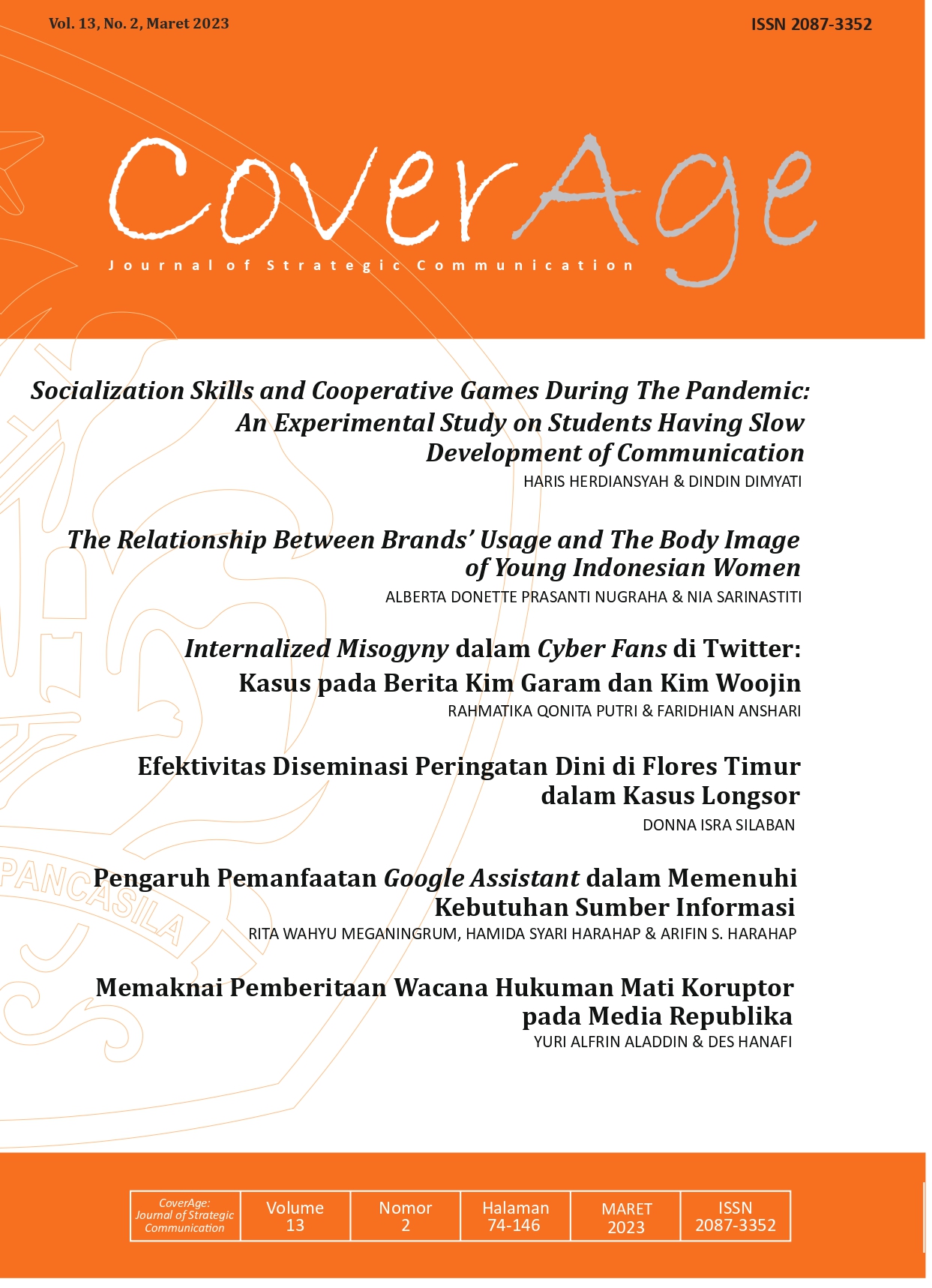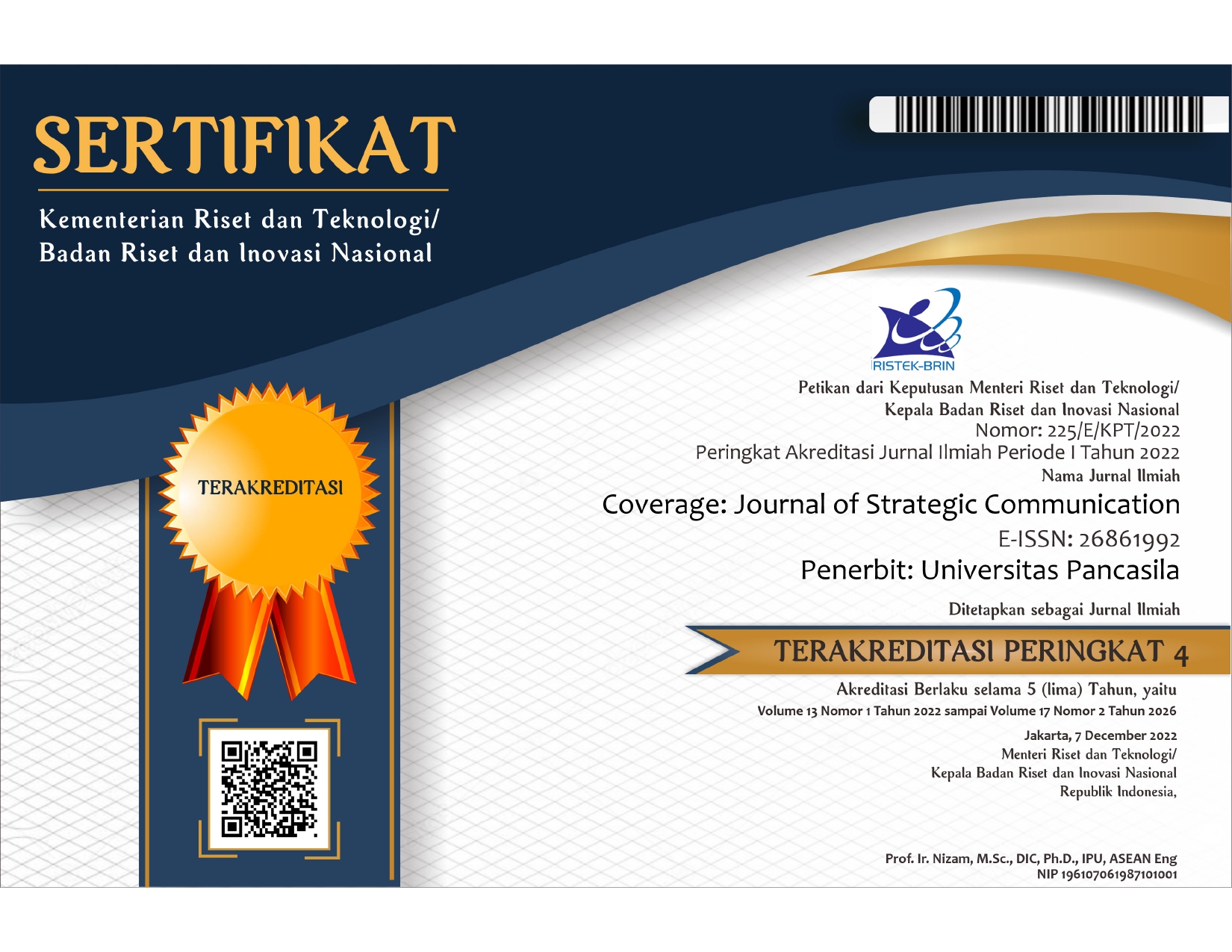Socialization Skills and Cooperative Games During The Pandemic: An Experimental Study on Students Having Slow Development of Communication
DOI:
https://doi.org/10.35814/coverage.v13i2.4322Keywords:
Socialization Skills, Late Childhood, Cooperative PlayAbstract
Children are affected by the Covid-19 pandemic, which has lasted nearly three years. The pandemic condition, which requires everyone to stay at home and interact at home, has a negative impact on the development of children's social interactions, particularly their socialization skills. It was discovered that there was a delay in the development of children's socialization due to hampered social learning processes, lack of direct social interaction, lack of social stimulation, and so on, causing children to grow up as individuals who were shy, inferior, and lacked social confidence, necessitating an intensive effort to accelerate their socialization skills so that children's mental development is not hampered, and they can re-adapt to their peers. The experimental design used was a two-sample pre-test-post-test design, with all respondents divided into experimental and control groups. Purposive sampling was used in this study. A socialization skills questionnaire was used as the research instrument. Pearson's alpha was used for validity tests, and Cronbach's alpha was used for reliability tests. Multiple regression was used in hypothesis testing. The data analysis revealed that the difference between pre-test and post-test scores had a t-value of 5.079 and a probability value (sig. 2-tailed) of 0.000 (P0.01) . This finding indicates a difference in socialization skills between KE and KK.
References
Alkomari, A. (2020). Analisis Komunikasi Krisis Gubernur Jawa Tengah Ganjar Pranowo Menghadapi Pandemi Covid-19. CoverAge: Journal of Strategic Communication, 11(1), 27-37.https://doi.org/10.35814/coverage.v11i1.1729
Attawibulkul, S., Sornsuwonrangsee, N., Jutharee, W., &Kaewkamnerdpong, B. (2018). Using storytelling robots for supporting autistic children in the theory of mind. International Journal of Bioscience, Biochemistry, and Bioinformatics, 9(2), 100–108.https://doi.org/10.17706/ijbbb.2019.9.2.100-108
Bharatharaj, J., Huang, L., Mohan, R. E., Al-Jumaily, A., & Krägeloh, C. (2017). Robot-assisted therapy for learning and social interaction of children with an autism spectrum disorder. Robotics, 6(1), 4. https://doi.org/10.3390/robotics6010004
Cheung, M. W., L. & Vijayakumar R. (2016) A guide to conducting a meta-analysis. Neuropsychology Rev 26,121–128. https://doi.org/10.1007/s11065-016-9319-z
Elflein, J. (2020). Prevalence of autism spectrum disorder among children in select countries worldwide as of 2020. Statista. https://www.statista.com/statistics/676354/autismrate-among-children-select-countries-worldwide/
Fernandes, C., (2019) The relationship between teacher communication, and teacher credibility, student motivation, and academic achievement in India (UMI No. 10980753) [Doctoral dissertation, Concordia University, Portland]. ProQuest Dissertations & Theses Global database.
Hurlock, EB., 1991, Perkembangan Anak Jilid I, Jakarta: Erlangga
Khojanazarova. N., (2022). The Essence of Socialization of Children in Preschool Educational Institutions on the Basis of a Systematic Approach. World Bulletin of Social Sciences, 7, 5-7. Retrieved from https://scholarexpress.net/index.php/wbss/article/view/515
Kumazaki, H., Yoshikawa, Y., Yoshimura, Y., Ikeda, T., Hasegawa, C., Saito, D. N., Tomiyama, S., An, K., Shimaya, J., Ishiguro, H., Matsumoto, Y., Minabe, Y., & Mitsuru K. (2018). The impact of robotic intervention on joint attention in children with autism spectrum disorder. Molecular Autism 9(46), 2–10. https://doi.org/10.1186/s13229-018-0230-8
Mayumi. A., (2021) "The Role Of The Adult In The Child's Early Music Socialization: A Vygotskian Perspective," Visions of Research in Music Education: Vol. 16, Article 25. Available at: https://opencommons.uconn.edu/vrme/vol16/iss5/25
Pennazio, V. (2017). Social robotics to help children with autism in their interactions through imitation. Research on Education and Media, 9(1), 10–16. https://doi.org/10.1515/rem-2017-0003;
Scassellati, B., Boccanfuso, L., Huang, C.-M., Mademtzi, M., Qin, M., Salomons, N., Ventola, P., &Shic, F. (2018). Improving socialization skills in children with ASD using a long-term, in-home social robot. Science Robotics, 3(21), eaat7544. https://doi.org/10.1126/scirobotics.aat7544
Tedjasaputra, M., 2001. Bermain, Mainan dan Permainan, Jakarta: Grasindo
Zakaria, F., Mulyana, D., Rachmawati, T. S., Khadijah, U. L. S., Gemiharto, I., &Hafiar, H. (2022). Perubahan Pola Komunikasidalam Proses Pembelajaran di PondokPesantren pada Masa Pandemi Covid-19. CoverAge: Journal of Strategic Communication, 12(2), 72-84.https://doi.org/10.35814/coverage.v12i2.2349





















